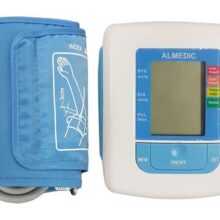Aneroid Sphygmomanometer
Login For Health Care Pricing
In Stock
This aneroid sphygmomanometer is equipped with a manual inflatable cuff and a dial that displays the measured blood pressure.
Sphygmomanometers, commonly known as blood pressure monitors, are essential tools used in sports medicine to measure blood pressure and assess cardiovascular health in athletes.
These instruments play a crucial role in monitoring blood pressure levels, evaluating cardiovascular responses to exercise, and optimizing performance.
Sphygmomanometers provide valuable data that help healthcare professionals identify potential cardiovascular issues, guide training programs, and ensure athletes’ overall well-being.
In this article, we explore the uses of sphygmomanometers in sports medicine and their significance in monitoring blood pressure for health and performance.
Sphygmomanometers are primarily used to monitor blood pressure in athletes. Blood pressure is a key indicator of cardiovascular health, reflecting the force exerted by blood against the walls of arteries during each heartbeat.
Regular blood pressure measurements allow healthcare professionals to assess an athlete’s cardiovascular status and detect any abnormalities. Monitoring blood pressure helps identify hypertension (high blood pressure) or hypotension (low blood pressure) and provides valuable information for managing cardiovascular risks and optimizing performance.
Sphygmomanometers assist in evaluating an athlete’s cardiovascular fitness. By monitoring blood pressure at rest and during exercise, healthcare professionals can assess the cardiovascular system’s response to physical activity.
Blood pressure responses during exercise can indicate the efficiency of the heart and blood vessels in delivering oxygenated blood to working muscles. Abnormal blood pressure responses, such as excessively high or low readings, may suggest inadequate cardiovascular fitness or underlying health conditions.
Monitoring blood pressure during exercise helps healthcare professionals tailor training programs and optimize cardiovascular fitness to enhance athletic performance.
Sphygmomanometers are crucial tools in managing hypertension, a common condition among athletes and the general population. Hypertension can increase the risk of cardiovascular diseases and adversely affect athletic performance. Regular blood pressure monitoring allows healthcare professionals to identify athletes with hypertension, assess their blood pressure patterns, and implement appropriate interventions.
Through lifestyle modifications, medication management, and monitoring of blood pressure responses, healthcare professionals can help athletes manage hypertension effectively and reduce associated health risks.
Sphygmomanometers assist in monitoring blood pressure responses in athletes who are taking medications that may affect cardiovascular function. Certain medications, such as beta-blockers or diuretics, may be prescribed to manage specific health conditions or enhance performance. Regular blood pressure measurements enable healthcare professionals to evaluate the effectiveness of medication regimens, assess their impact on blood pressure control, and optimize dosage adjustments as needed.
Monitoring blood pressure allows healthcare professionals to ensure that medications are providing the desired therapeutic effects while minimizing potential side effects.
Sphygmomanometers contribute to the overall assessment of cardiovascular health in athletes.
Regular blood pressure measurements provide a snapshot of an athlete’s cardiovascular well-being. Abnormal blood pressure readings may prompt further investigations, such as additional cardiac evaluations or laboratory tests, to assess cardiovascular health comprehensively.
Monitoring blood pressure enables healthcare professionals to identify potential cardiovascular risks, provide appropriate interventions, and optimize an athlete’s cardiovascular health and performance potential.
Sphygmomanometers are indispensable tools in sports medicine, providing healthcare professionals with valuable information about an athlete’s blood pressure and cardiovascular health.
By monitoring blood pressure, healthcare professionals can assess cardiovascular fitness, detect hypertension, manage medication regimens, and optimize an athlete’s overall cardiovascular well-being.
Regular blood pressure measurements guide training programs, minimize health risks, and contribute to the overall success and well-being of athletes. The use of sphygmomanometers enhances evidence-based practice, promotes cardiovascular health, and ensures the optimal performance of athletes in sports medicine.

Login For Health Care Pricing
In Stock
This aneroid sphygmomanometer is equipped with a manual inflatable cuff and a dial that displays the measured blood pressure.

Login For Health Care Pricing
In Stock
Digital blood pressure monitor that stores 80 readings and permits accurate blood pressure monitoring with no need for specialist training.

Login For Health Care Pricing
In Stock
Aneroid blood pressure unit with infant sized cotton cuff.

Login For Health Care Pricing
Typically Ships in 3-5 Business Days
Adult replacement blood pressure cuff.